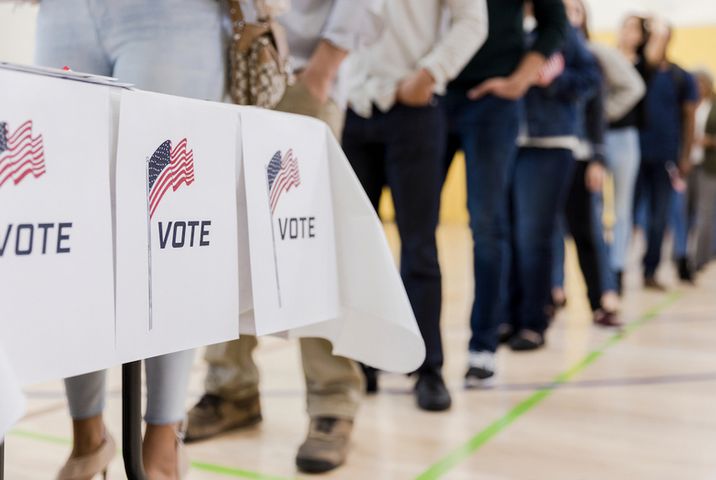(Photo: SDI Productions/Getty Images)
When Cheryl Schmidt, a retiree who recently moved to Graham from Michigan, stepped into her polling place on the second day of early voting, she could not believe what she saw: husbands and wives being taken to the same voting booths, one pair after another. She glanced at her friend and said, “Isn’t that illegal?”
In North Carolina, it is legal. In response to similar concerns that went viral on social media, the State Board of Elections posted an excerpt of the state’s election law forbidding voters from sharing a booth “except that spouses may occupy the same voting booth if both wish to do so.”
By contrast, many other states forbid this practice. In Schmidt’s previous home of Michigan, for example, the law only allows a voter to share a booth with their minor child or, in the case of voters with disabilities, someone who is legally providing assistance to complete their ballot — an exception that North Carolina carves out separately from the spousal allowance.
But Schmidt and others online — including a Mebane voter who reported seeing “countless husbands look over their wives shoulders as they voted” — contend that what they witnessed is unusual and could prevent some voters from expressing their true feelings at the polls.
“I’ve lived in three other states and I have never seen couples go into a booth together,” Schmidt said. “Even if you give people the option, you don’t know for sure [whether] that wife doesn’t really have the ability to stand up to her spouse and say, no, I don’t want to be in the same booth with him.”
She said that in at least a few cases, it appeared men were pointing to ballots to indicate to their wives how they should vote. “It’s just a little disheartening,” Schmidt said. “In this election, there are so many women’s issues at stake here.”
Schmidt said the friend who accompanied her to the polls, a longtime Durham resident who recently moved to Graham, said she had never seen anything like it. Others she mentioned it to were also surprised, Schmidt said.
Dawn Hurdle, the director of the Alamance County Board of Elections, said she had heard no reports of “voters being forced to share a voting booth,” but added that polling places in the county have put up signs at check-in stations that read, “Serving one voter at a time.” The board has also instructed voting equipment assistants not to assume couples wish to vote together without first asking.
Because voters are legally required to stand far enough apart to avoid check-in conversations being overheard, Hurdle wrote that it is possible Schmidt simply did not hear the married couples request to vote in the same booth. Schmidt said she did not hear the check-in conversations — but the prevalence of the practice struck her nonetheless.
In a presidential race where North Carolina polls have showed the candidates in a dead heat — and with gender divides in voter preferences at historic highs — even a small number of voters who do not feel safe casting ballots that reflect their true preference could swing the election.
That phenomenon may be part of why the 2024 elections have brought increased attention to spousal dynamics when it comes to voting. In a Good Morning America interview that spread like wildfire across social media, an 81-year-old Georgia woman revealed this would be her first time casting a ballot — something she had never done before because her husband did not think she should.
These concerns motivated Olivia Dreizen Howell and her sister, Jenny Dreizen, to co-found Vote Without Fear, a nonpartisan voter education platform that has sought to inform voters on methods to ensure their choice remains private. “We want people to feel secure and be able to vote for their conscience,” Dreizen said.
Some North Carolina voters reached out to Dreizen Howell through private messages on social media to report married couples called up to vote in the same booth — claims that alarmed both sisters given their ongoing voter education campaign. “It’s 2024, women have exactly the same amount of rights to vote as men do,” Dreizen Howell said.
Dreizen, her sister, said she hopes the publicity around this issue — as well as the explicit signs and instructions now being provided in Alamance County — will ensure poll workers refrain from assuming spouses want to vote together.
“Poll workers may have thought they were doing something nice, you know, moving the line along, but the way that the law is stated is that, the poll workers are not meant to encourage this practice, they’re meant to allow for it if the couple requests it,” Dreizen said.
The sisters said voters who want to make sure their ballot remains private can still find excuses to go to early voting on separate occasions from their spouses — but added that the most important thing is “staying safe in your marriage.” Their group maintains an “It’s Your Vote Hotline” that voters with concerns can call at 1-888-291-3027 and offers resources on how to ensure ballot privacy at votewithoutfear.com.
Voters seeking general information on early voting can visit the State Board of Elections website for help. North Carolina requires photo identification to vote and offers same-day registration for voters who have not registered yet. Early voting began on Oct. 17 and lasts until 3 p.m. on Nov. 2. Voters can also head to the polls on Election Day, Nov. 5 between 6:30 a.m. and 7:30 p.m., but must be registered beforehand.


Leave a Comment